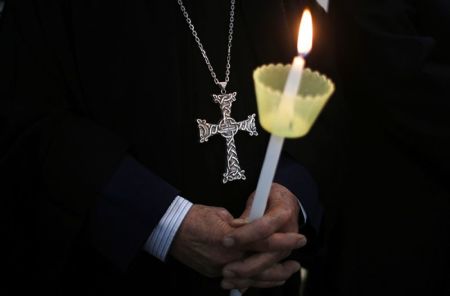Egypt: Islamist Murders Christian for Selling Alcohol in Alexandria as Attacks Mount Against Believers

A Coptic Christian man was murdered by a Muslim attacker in Alexandria, Egypt, last week because he was selling alcohol, which is legal in the city.
Yusuf Lama's killing on the night of Jan. 3 was captured by surveillance footage, according to AMI Newswire, where he was stabbed twice in the throat by a man in a green jacket.
Police have since caught the killer, and although they deny that the attack was religiously motivated, others have said otherwise.
"After he was killed, some Egyptians on social media stressed the fact he was a Copt selling alcohol, as if in some way he provoked the attack," said Mina Rizkallah Abdelmalak, a Coptic activist in Washington, D.C.
"What is even more surprising is that Egyptian authorities will often deny sectarian attacks take place. This trend has continued under the rule of President [Abdel] Sissi."
Abdelmalak said that when the minority Coptic population in Egypt is attacked by Muslim hardliners, which continues to happen even under Sissi, there is little or delayed help on the side of government officials.
"When incidents involving Copts happen, the police and ambulances are often slow to arrive, but it is unclear if this is the result of sectarian bias, the lack of professionalism among Egypt's emergency services or some mix of the two," the activist said.
"The military and government should work to increase security."
At least 28 people were killed and another 49 were injured on Dec. 11 during a bomb blast at St. Mark's Cathedral in Cairo's Abbassyia district, in one of the worst attacks on Copts in years.

Twenty-two year-old Islamic State terror group supporter Mahmoud Shafiq Mohammed Mustafa was identified by the government as the culprit, who reportedly entered the church with a suicide vest, killing mostly women and children in the explosion.
Coptic Bishop Anba Angaelos told The Christian Post in an interview last month that despite the tragedy, Christians were ready to forgive their attackers.
"Historically in Egypt, after everyone of these attacks or similar attacks, of course there has been anger and public outcry, but there hasn't been retaliation or revenge," Angaelos told CP. "That is one thing that we are very thankful for."
Coptic Christians marked Christmas on Saturday, following the Julian calendar, though admitted that the celebrations were somber.
"There is no Christmas for us," said Samir Abdo, whose 10-year-old granddaughter, Maggie, died in the bombing. "The moment Maggie was taken to the hospital, the clock just stopped."
"No one feels festive. I haven't baked a cake," added Labib, a 47-year-old mother of two. "Fear grips me each time one of my three children goes out."
Abdelmalak said that in order to show that it cares about Christians, the Egyptian government needs to punish attackers who carry out acts of violence, and recognize that followers of Jesus are being targeted.
Other attacks have included a riot last May in the province of Minya, which saw hundreds of Muslims set fire to Christians' homes due to rumors of an inter-sectarian romantic relationship.
Ahmed Naguib, a human rights activist, said that attacks that happen in Upper Egypt, away from major cities like Alexandria and Cairo, receive even less attention.
"It's in these areas where the government uses reconciliation where it should instead punish those responsible for crimes against Christians," Naguib said.






















